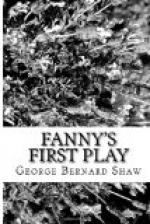KNOX. [rising, virtuously indignant] You sit there after carrying on with my daughter, and tell me coolly youre married.
MARGARET. Papa: you really must not tell people that they sit there. [He sits down again sulkily].
DUVALLET. Pardon. Carrying on? What does that mean?
MARGARET. It means—
KNOX. [violently] Hold your tongue, you shameless
young hussy.
Dont you dare say what it means.
DUVALLET. [shrugging his shoulders] What does it mean, Rudolph?
MRS KNOX. If it’s not proper for her to say, it’s not proper for a man to say, either. Mr Doovalley: youre a married man with daughters. Would you let them go about with a stranger, as you are to us, without wanting to know whether he intended to behave honorably?
DUVALLET. Ah, madam, my daughters are French girls. That is very different. It would not be correct for a French girl to go about alone and speak to men as English and American girls do. That is why I so immensely admire the English people. You are so free—so unprejudiced—your women are so brave and frank—their minds are so—how do you say?—wholesome. I intend to have my daughters educated in England. Nowhere else in the world but in England could I have met at a Variety Theatre a charming young lady of perfect respectability, and enjoyed a dance with her at a public dancing saloon. And where else are women trained to box and knock out the teeth of policemen as a protest against injustice and violence? [Rising, with immense elan] Your daughter, madam, is superb. Your country is a model to the rest of Europe. If you were a Frenchman, stifled with prudery, hypocrisy and the tyranny of the family and the home, you would understand how an enlightened Frenchman admires and envies your freedom, your broadmindedness, and the fact that home life can hardly be said to exist in England. You have made an end of the despotism of the parent; the family council is unknown to you; everywhere in these islands one can enjoy the exhilarating, the soul-liberating spectacle of men quarrelling with their brothers, defying their fathers, refusing to speak to their mothers. In France we are not men: we are only sons—grown-up children. Here one is a human being—an end in himself. Oh, Mrs Knox, if only your military genius were equal to your moral genius—if that conquest of Europe by France which inaugurated the new age after the Revolution had only been an English conquest, how much more enlightened the world would have been now! We, alas, can only fight. France is unconquerable. We impose our narrow ideas, our prejudices, our obsolete institutions, our insufferable pedantry on the world by brute force—by that stupid quality of military heroism which shews how little we have evolved from the savage: nay, from the beast. We can charge like bulls; we can spring on our foes like gamecocks; when we are overpowered by reason, we can die fighting like




